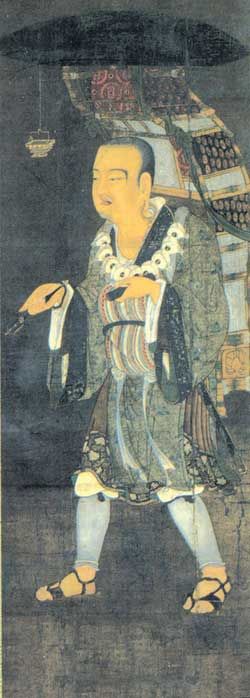A Walk in the Country
In 629 a Chinese Buddhist monk named Xuanzan (pr. Shwan-dzang) decided to go to India. An avid student of the scriptures, he became convinced that the Chinese texts were corrupted or incomplete, and determined that he would go back to the source of Buddhism, educate himself, and do what he could to sort things out.
A worthy intention, but he faced significant challenges. As an example, the Emperor had banned monks from leaving the country. Also, the roads were bad and filled with bandits, he had no travel experience outside China, and no monk in living memory had made the journey (Fa Xian had accomplished the feat a couple hundred years before).
All things considered, it went pretty well. A brief itinerary:
- 629 - Evades border guards and gets across Gobi desert on foot after guides abandon him. King of Turfan welcomes him, doesn't want him to leave. Hunger strike convinces King to let him go on.
- 630 - Evades bandits and passes through Yanqi and Kucha on his way to Kyrgyzstan. Continues on to Tashkent and Samarkand, already the cosmopolitan central hubs of the Silk Road. Passes through the Iron Gate, and goes on to Balkh (now part of Afghanistan), site of the Nava Viahara, in Xuanzang's estimation the westernmost Buddhist temple in the world.
- 631-633 - Arrives in Kashmir, and accepts the hospitality of Buddhism-enthusiast King Kanishka. Engages leading Buddhist thinkers in discussion of key issues, participates and makes careful notes on the Fourth Buddhist Council. By the time he leaves he is a skilled debater, able to take either side of the Mahayana/Theravada argument.
- 634-644 - Enters India, makes pilgrimages to the key holy places of Buddhism. In 636 he is kidnapped by pirates who intend to make him a human sacrifice, but a huge storm blows up and they rapidly convert to his views. Engaging in discussion and debate with leading Buddhists across India, he becomes one of the leading religious thinkers of the age.
- 645 - Evades more bandits and returns to China with 657 Sanskrit manuscripts for translation, is met by cheering crowds and honored by the Emperor.

Xuanzang's journey was a major success in another way. He was a very accurate chronicler of his travels, making his journal an important research tool for historians. If you are interested in, say, Bengali politics of the 7th century, Xuanzang's is your only eyewitness account. And the man knew how to give a report:
Taxila was above 2000 li in circuit, the capital being above 10 li in circuit. The chiefs were in a state of open feud, the royal family being extinguished; the country had formerly been subject to Kapisa but now it was dependency of Kashmir; it had a fertile soil and bore good crops, with flowing streams and luxuriant vegetation; the climate was genial; and the people, who were plucky, were adherents of Buddhism. Although the monasteries were numerous, many of them were desolate, and the Brethren, who were very few, were all Mahayanists.Apparently the British were using his distance estimates in Afghanistan well into the 19th century, because they were better than anything else they had. Pretty good, considering he made those estimates in the time of King Arthur. This article describes how modern archaeologists have made use of his account to make new discoveries.
Clearly an immensely capable man, and according to all reports he epitomized the Buddhist ideal of excellence and humility. His spiritual insights, however, are not what a modern 'romantic' Buddhist might expect. He prayed directly to a God, particularly in times of stress - in a way that would be more familiar to a Christian monk than to a ZCLA member. As a good Confucian, he believed in duty and a well-ordered society, concepts likewise less-emphasized in later Buddhist practice. When his hosts disparaged China and asked him to stay in India, he replied:
The King of the Law in establishing the principles of his doctrine, designed them for universal diffusion. Moreover, China is a highly civilized country where the people have a high standard of behavior, the Emperor is sagacious, and his ministers are loyal, and the father is kind to his son, while the son is filial to his father. Kindness and righteousness are esteemed and the aged and wise are respected.After his return he wielded tremendous influence. He spent the rest of his life translating and interpreting texts, and founded the important but short-lived Fa-Hsiang school. The great flaw in the school, from a popularity standpoint, was that in his travels and debates, Xuanzang had concluded that (in the words of historian Sally Wriggins) "not everyone had the Buddha nature ... not everyone could attain salvation." This made it tough to recruit when Pure Land disciples were saying everyone could be saved, and you didn't even have to go to the monastery to do it.
But Xuanzang made Chinese Buddhism better. The personal achievement of his journey, the example of his high character, his scholarly work, and his good relationship with the Emperor, all helped strengthen and stabilize Buddhist institutions in China. Just as he intended, when he set out in darkness that night in 629.
A good brief account of Xuanzang's journey can be found in When Asia Was the World. For a book-length treatment I recommend very highly Sally Wriggins' The Silk Road Journey with Xuanzang.


2 Comments:
Most interesting, and the elements of a timeless truth: the great journey allows one to discover the nature of one's own land.
Keep these coming.
Post a Comment
<< Home